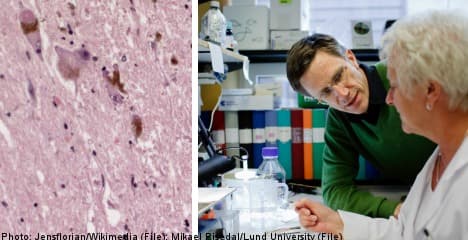Swedish breakthrough could slow Parkinson's

A discovery by researchers at Lund University in southern Sweden on how Parkinson's disease spreads to the brain may lead to new treatments.
Diseased proteins that spread from cell to cell have been identified by scientists at the university in a study published in the Journal of Clinical Investigation.
"We are one step closer to understanding how the neuropathology spreads throughout the nervous system in Parkinson's disease, which opens up avenues for new treatments," Professor Patrik Brundin at Lund University said in a statement on Wednesday.
"Hopefully in the future, we will be able to inhibit this spread and slow down the relentless disease progression and worsening of symptoms in patients," he added.
The misfolding of abnormal proteins in brain cells is a key element in Parkinson's disease development, explained Brudin. His study suggests that the sick proteins slowly move between cells, eventually triggering the destruction of the new host cell.
The discovery could lead to new therapeutic strategies for neurodegenerative diseases aimed at blocking the spread of protein misfolding throughout the brain. The researchers hope to develop treatment that helps prevent the disease from worsening and allows it to develop into a milder form.
"This is a significant step forward in our understanding of the potential role of cell-to-cell transfer of alpha-synuclein in Parkinson's disease pathogenesis and we are very excited about the findings," said Brundin, who led a team of investigators from research centres in Denmark, France and Portugal.
Damaged alpha-synuclein proteins, which are implicated in Parkinson's disease, can spread in a "prion-like" manner, an infection model previously described for diseases such as BSE, or mad cow disease.
Previous observations that aggregated alpha-synuclein proteins gradually appear in healthy young neurons transplanted to the brains of Parkinson's patients initially led to the group's hypothesis of cell-to-cell protein transfer. The theory has now been tested in several cell culture experiments.
Transplant trials in mice strengthened the theory of cell-to-cell transfer. The findings support the research group's hypothesis that protein aggregates crossing cellular membranes contribute to the pathogenesis of neurodegenerative diseases.
Separately, Sweden is set to become the first country in the world to have a national disease registry for Parkinson's disease.
The initiative is collaborative effort between Lund University, Skåne University Hospital and Karolinska Institute, and tests of the database are scheduled to begin this spring.
“The register will really have an effect within two different areas. On the one hand, the immediate conditions for improvements in healthcare – doctors gain direct access to information of relevance to the patient; on the other hand, the research possibilities – being able to use the register to look at the impact of different treatments in larger population groups over a longer time period”, Lund University professor Per Odin said in a statement.
Comments
See Also
Diseased proteins that spread from cell to cell have been identified by scientists at the university in a study published in the Journal of Clinical Investigation.
"We are one step closer to understanding how the neuropathology spreads throughout the nervous system in Parkinson's disease, which opens up avenues for new treatments," Professor Patrik Brundin at Lund University said in a statement on Wednesday.
"Hopefully in the future, we will be able to inhibit this spread and slow down the relentless disease progression and worsening of symptoms in patients," he added.
The misfolding of abnormal proteins in brain cells is a key element in Parkinson's disease development, explained Brudin. His study suggests that the sick proteins slowly move between cells, eventually triggering the destruction of the new host cell.
The discovery could lead to new therapeutic strategies for neurodegenerative diseases aimed at blocking the spread of protein misfolding throughout the brain. The researchers hope to develop treatment that helps prevent the disease from worsening and allows it to develop into a milder form.
"This is a significant step forward in our understanding of the potential role of cell-to-cell transfer of alpha-synuclein in Parkinson's disease pathogenesis and we are very excited about the findings," said Brundin, who led a team of investigators from research centres in Denmark, France and Portugal.
Damaged alpha-synuclein proteins, which are implicated in Parkinson's disease, can spread in a "prion-like" manner, an infection model previously described for diseases such as BSE, or mad cow disease.
Previous observations that aggregated alpha-synuclein proteins gradually appear in healthy young neurons transplanted to the brains of Parkinson's patients initially led to the group's hypothesis of cell-to-cell protein transfer. The theory has now been tested in several cell culture experiments.
Transplant trials in mice strengthened the theory of cell-to-cell transfer. The findings support the research group's hypothesis that protein aggregates crossing cellular membranes contribute to the pathogenesis of neurodegenerative diseases.
Separately, Sweden is set to become the first country in the world to have a national disease registry for Parkinson's disease.
The initiative is collaborative effort between Lund University, Skåne University Hospital and Karolinska Institute, and tests of the database are scheduled to begin this spring.
“The register will really have an effect within two different areas. On the one hand, the immediate conditions for improvements in healthcare – doctors gain direct access to information of relevance to the patient; on the other hand, the research possibilities – being able to use the register to look at the impact of different treatments in larger population groups over a longer time period”, Lund University professor Per Odin said in a statement.
Join the conversation in our comments section below. Share your own views and experience and if you have a question or suggestion for our journalists then email us at [email protected].
Please keep comments civil, constructive and on topic – and make sure to read our terms of use before getting involved.
Please log in here to leave a comment.